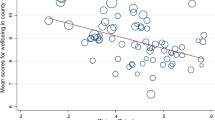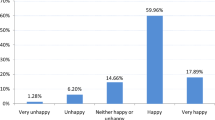Abstract
By combining data from the 2011 Vietnam National Aging Survey and the 2011 Rural, Agricultural and Fishery Census, this study examined whether expenditure inequality has any effect on the quality of life (life satisfaction or happiness) among the elderly in rural Vietnam. It was confirmed from our regression analysis that individuals who live in the communes with high inequality tend to self-report as being less happy, even after controlling for various individual and household attributes. The findings are robust to the choice of inequality measures and the specification of econometric models. We also find that older rural people who are farmers or poor are more sensitive to inequality. Given that these people tend to be less happy than others, the result shows the risk that inequality further lowers their subjective well-being. This finding, in part, supports the view that rural Vietnam is not a mobile society.
Similar content being viewed by others
Notes
This is because happiness is a crucial component of quality of life (Sumngern et al. 2010).
Another possible explanation, is similar to that used by Gray et al. (2008), is that while many Vietnamese old people in rural areas do not live with their children or grandchildren, their home close to their children/grandchildren’s home. Furthermore, although the elderly do not co-reside with their children/grandchildren, their children/grandchildren still contribute positively to their material well-being and still maintain contact and visits.
References
Ahn, H., Roll, S. J., Zeng, W., Frey, J. J., Reiman, S., & Ko, J. (2015). Impact of income inequality on workers’ life satisfaction in the US: A multilevel analysis. Social Indicators Research, 128(3), 1347–1363.
Alesina, A., Di Tella, R., & MacCulloch, R. (2004). Inequality and happiness: Are Europeans and Americans different? Journal of Public Economics, 88(9), 2009–2042.
Ball, R., & Chernova, K. (2008). Absolute income, relative income, and happiness. Social Indicators Research, 88(3), 497–529.
Brown, P. H., & Tierney, B. (2009). Religion and subjective well-being among the elderly in China. The Journal of Socio-Economics, 38(2), 310–319.
Celse, J. (2016). An experimental investigation of the impact of absolute and relative inequalities on individual satisfaction. Journal of Happiness Studies. doi:10.1007/s10902-016-9757-6.
Cheah, Y. K., & Tang, C. F. (2013). The socio-demographic determinants of self-rated happiness: The case of Penang, Malaysia. Hitotsubashi Journal of Economics, 54(1), 1–16.
Chyi, H., & Mao, S. (2012). The determinants of happiness of China’s elderly population. Journal of Happiness Studies, 13(1), 167–185.
Clark, A.E. (2003). Inequality-aversion and income mobility: A direct test. Delta. Boulevard Jourdan, France. Retrieved from http://www.delta.ens.fr/abstracts/wp200311.pdf.
Coudouel, A., Hentschel, J. S., & Wodon, Q. T. (2002). Chapter 1: Poverty measurement and analysis. In J. Klugman (Ed.), A source book for poverty reduction strategies (Vol. 1, pp. 29–76). Washington, DC: The World Bank.
Deaton, A. (1997). The analysis of household surveys: A microeconometric approach to development policy. Baltimore, MD: The Johns Hopkins University Press.
Diener, E., Diener, M., & Diener, C. (1995). Factors predicting the subjective well-being of nations. Journal of Personality and Social Psychology, 69(5), 851.
Dolan, P., Peasgood, T., & White, M. (2008). Do we really know what makes us happy? A review of the economic literature on the factors associated with subjective well-being. Journal of Economic Psychology, 29(1), 94–122.
Eggers, A., Gaddy, C., & Graham, C. (2006). Well-being and unemployment in Russia in the 1990s: Can society’s suffering be individuals’ solace? The Journal of Socio-Economics, 35(2), 209–242.
Elbers, C., Lanjouw, J.O., & Lanjouw, P. (2002). Micro-level estimation of welfare. In Policy Research Working Paper 2911. Washington, DC: The World Bank.
Elbers, C., Lanjouw, J. O., & Lanjouw, P. (2003). Micro-level estimation of poverty and inequality. Econometrica, 71(1), 355–364.
Evans, M., Gough, I., Harkness, Susan, McKay, A., Thanh, H. D., & Thu, N. D. L. (2007). The relationship between old age and poverty in Viet nam. Hanoi: United Nations Development Programme.
Ferrer-i-Carbonell, A., & Frijters, P. (2004). How important is methodology for the estimates of the determinants of happiness? The Economic Journal, 114(497), 641–659.
Ferrer-i-Carbonell, A., & Ramos, X. (2014). Inequality and happiness. Journal of Economic Surveys, 28(5), 1016–1027.
Goodman, A., & Oldfield, Z. (2004). Permanent differences? Income and expenditure inequality in the 1990s and 2000s. London: IFS Reports, Institute for Fiscal Studies.
Graham, C., & Felton, A. (2006). Inequality and happiness: Insights from Latin America. The Journal of Economic Inequality, 4(1), 107–122.
Gray, R. S., Rukumnuaykit, P., Kittisuksathit, S., & Thongthai, V. (2008). Inner happiness among Thai elderly. Journal of Cross-Cultural Gerontology, 23(3), 211–224.
Hagerty, M. R. (2000). Social comparisons of income in one’s community: evidence from national surveys of income and happiness. Journal of Personality and Social Psychology, 78(4), 764.
Hajdu, T., & Hajdu, G. (2014). Reduction of income inequality and subjective well-being in Europe. Economics, 8(35), 1–29.
Haller, M., & Hadler, M. (2006). How social relations and structures can produce happiness and unhappiness: An international comparative analysis. Social Indicators Research, 75(2), 169–216.
Helliwell, J. F. (2003). How’s life? Combining individual and national variables to explain subjective well-being. Economic Modelling, 20(2), 331–360.
Hirschman, A. O., & Rothschild, M. (1973). The changing tolerance for income inequality in the course of economic development. The Quarterly Journal of Economics, 87(4), 544–566.
Hochman, H. M., & Rodgers, J. D. (1969). Pareto optimal redistribution. The American Economic Review, 59(4), 542–557.
Jiang, S., Lu, M., & Sato, H. (2012). Identity, inequality, and happiness: Evidence from urban China. World Development, 40(6), 1190–1200.
Kingdon, G. G., & Knight, J. (2007). Community, comparisons and subjective well-being in a divided society. Journal of Economic Behavior & Organization, 64(1), 69–90.
Krause, N. (2003). Religious meaning and subjective well-being in late life. The Journals of Gerontology Series B Psychological Sciences and Social Sciences, 58(3), S160–S170.
Lanjouw, P., Marra, M., & Nguyen, C.V. (2013). Vietnam’s evolving poverty map: patterns and implications for policy. In World Bank Policy Research Working Paper 6355. Washington, DC: The World Bank.
Long, G. T., & Pfau, W. D. (2009). Vulnerability of vietnamese elderly to poverty: Determinants and policy implications. Asian Economic Journal, 23(4), 419–437.
Matsushima, M., & Matsunaga, Y. (2015). Social capital and subjective well-being in Japan. VOLUNTAS: International Journal of Voluntary and Nonprofit Organizations, 26(4), 1016–1045.
Morawetz, D., Atia, E., Bin-Nun, G., Felous, L., Gariplerden, Y., Harris, E., et al. (1977). Income distribution and self-rated happiness: Some empirical evidence. The Economic Journal, 87(347), 511–522.
Myers, D. G. (2000). The funds, friends, and faith of happy people. American Psychologist, 55(1), 56.
Neckerman, K. M., & Torche, F. (2007). Inequality: Causes and consequences. American Sociological Review, 33, 335–357.
Nguyen, C. V. (2011). Poverty projection using a small area estimation method: Evidence from Vietnam. Journal of Comparative Economics, 39(3), 368–382.
Nguyen, J. K., Fleming, C. M., & Su, J. J. (2015). Does income inequality make us less happy? Australian Economic Review, 48(1), 15–32.
Ohtake, F., & Tomioka, J. (2004). Who supports redistribution? Japanese Economic Review, 55(4), 333–354.
Oshio, T., & Kobayashi, M. (2011). Area-level income inequality and individual happiness: Evidence from Japan. Journal of Happiness Studies, 12(4), 633–649.
Oshio, T., Nozaki, K., & Kobayashi, M. (2011). Relative income and happiness in Asia: Evidence from nationwide surveys in China, Japan, and Korea. Social Indicators Research, 104(3), 351–367.
Oshio, T., & Urakawa, K. (2014). The association between perceived income inequality and subjective well-being: Evidence from a social survey in Japan. Social Indicators Research, 116(3), 755–770.
Pfau, W. D., & Long, G. T. (2010). Remittances, living arrangements and the welfare of the elderly in Vietnam. Asian and Pacific Migration Journal, 19(4), 447–472.
Ravallion, M., & Lokshin, M. (2000). Who wants to redistribute? The tunnel effect in 1990s Russia. Journal of Public Economics, 76(1), 87–104.
Schneider, S. M. (2015). Income inequality and subjective wellbeing: Trends, challenges, and research directions. Journal of Happiness Studies, 17(4), 1719–1739.
Schröder, M. (2016). How income inequality influences life satisfaction: Hybrid effects evidence from the German SOEP. European Sociological Review, 32(2), 307–320.
Schwarze, J., & Härpfer, M. (2007). Are people inequality averse, and do they prefer redistribution by the state? evidence from german longitudinal data on life satisfaction. The Journal of Socio-Economics, 36(2), 233–249.
Senik, C. (2004). When information dominates comparison: Learning from Russian subjective panel data. Journal of Public Economics, 88(9), 2099–2123.
Senik, C. (2009). Income distribution and subjective happiness: A survey. OECD Social, Employment and Migration Working Papers, No. 96. Paris: OECD Publishing. doi:10.1787/218860720683.
Smyth, R., & Qian, X. (2008). Inequality and happiness in urban China. Economics Bulletin, 4(23), 1–10.
Sumngern, C., Azeredo, Z., Subgranon, R., Sungvorawongphana, N., & Matos, E. (2010). Happiness among the elderly in communities: A study in senior clubs of Chonburi Province, Thailand. Japan Journal of Nursing Science, 7(1), 47–54.
Truong, S. A., Bui, T., Goodkind, D., & Knodel, J. (1997). Living arrangements patrilineality and sources of support among elderly Vietnamese. Asia-Pacific Population Journal, 12(4), 69–88.
UNFPA. (2011). The ageing population in Viet Nam: Current status, prognosis, and possible policy responses. Hanoi: United Nations Population Fund (UNFPA).
Verme, P. (2011). Life satisfaction and income inequality. Review of Income and Wealth, 57(1), 111–127.
VNCA. (2012). Vietnamese 10 years of implementation of the Madrid international plan of action on aging. Hanoi: Vietnam National Commitee on Aging.
VWU. (2011). Vietnam aging survey (VNAS). Hanoi: Vietnam Women’s Union (VWU).
Wang, P., Pan, J., & Luo, Z. (2015). The impact of income inequality on individual happiness: Evidence from China. Social Indicators Research, 121(2), 413–435.
Wilkinson, R. G., & Pickett, K. E. (2009). Income inequality and social dysfunction. Annual Review of Sociology, 35, 493–511.
Wooldridge, J. M. (2013). Introductory econometrics: A modern approach (5th ed.). Mason, OH: South-Western Cengage Learning.
Zagorski, K., Evans, M. D., Kelley, J., & Piotrowska, K. (2014). Does national income inequality affect individuals’ quality of life in Europe? Inequality, happiness, finances, and health. Social Indicators Research, 117(3), 1089–1110.
Author information
Authors and Affiliations
Corresponding author
Appendices
Appendix 1
The Gini index can be calculated from the individual expenditure in the population (Deaton 1997):
where ρ i is the rank of person i in the Y-distribution, counting from the richest so that the richest has the rank of 1. The value of the Gini coefficient varies from 0 when everyone has the same expenditure to 1 when one person has everything. The closer a Gini coefficient is to one, the more unequal is the expenditure distribution.
The Theil L index of inequality, which is also known as Generalized entropy index GE(0), is calculated as follows:
The Theil L index ranges from 0 to infinity. A higher value of Theil L indicates more inequality.
The Theil T index of inequality, which is also known as Generalized entropy index GE(1), is calculated as:
The Theil T index ranges from 0 (lowest inequality) to ln(N) (highest inequality).
Appendix 2
See Table 6.
Rights and permissions
About this article
Cite this article
Tran, T.Q., Nguyen, C.V. & Van Vu, H. Does Economic Inequality Affect the Quality of Life of Older People in Rural Vietnam?. J Happiness Stud 19, 781–799 (2018). https://doi.org/10.1007/s10902-017-9851-4
Published:
Issue Date:
DOI: https://doi.org/10.1007/s10902-017-9851-4




